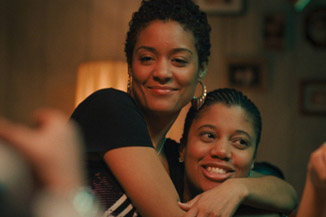|
|
BOP Interview: Dee ReesBy Ryan MazieJanuary 19, 2012
How was it coming out? DR: It was funny. When I first told my mom on the phone she said, "Oh, you are going to art school, it’s a phase, whatever." (Both laugh). She was really cool, but when I started dating this woman and it was serious, my mom and Grandmother flew in and were like, “Oh my God, what are you doing?’ They had an expectation that I was traumatized in some way and that it was a symptom of something else. I had to convince them that it’s not something else, I’m the same person I’ve always been. My Dad flew in the next weekend and he thought it was because I got divorced and I told him it wasn’t because of that and that getting back together definitely wouldn’t help (both laugh). Then there were some years of silence until they came around. My mom spent Christmas with me for the first time last year. The more comfortable I was, the more comfortable they were. Do you think the coming out issue presented in the film has changed with people being more accepting since you first wrote the script and shot the short? DR: I think it depends on who you are and where you are from. I’m from Nashville, Tennessee, where it is still not totally cool. I think there is more visibility for gays on TV, but I don’t know if it makes it any easier, necessarily. AO: I feel like some place like New York City, where I’m from, it may look and seem more easy, because there are places in schools where you can go, but in terms of family dynamics, I don’t think it is any easier. Kids are still being put out of their houses, so it depends. DR: Los Angeles maybe, but Iowa probably not. There is a fragmenting of identity where you are asked to leave a part of you behind whether it be your queerness or blackness.
|

|
|
|

|
Wednesday, May 1, 2024
© 2024 Box Office Prophets, a division of One Of Us, Inc.


